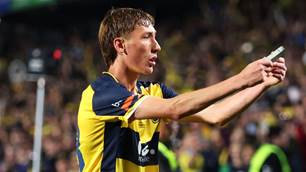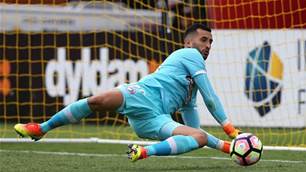YOU could be forgiven for thinking Cassio has only ever played in Australia after seven years playing for Adelaide United, but to most Reds fans, he's now part of the furniture.
Cassio is their token "Braussie" - but had you asked him early in his career if he would ever play football in Australia, he would have kindly laughed off the suggestion.
All the kid from Rio ever wanted since he was just four years old was to become a footballer. But then again, he was Brazilian...
"Every kid in Brazil - their dream is to become a footballer," he tells me. "Pretty much all the players start playing futsal or street football. We would use thongs to make the goals, socks or scrunched up paper as the ball, and we would be barefoot. Our feet would always be bleeding."
It's a vision that's easy to imagine - a country full of talented Brazilian kids swarming the streets all hoping to get a shot at the big time one day. To be professionals, to be able to provide for their families - for many kids in Brazil, the pressure to make it is huge.
"Most of the players growing up in Brazil are poor - football is their only option," Cassio says. "The families put the pressure on the boys to be footballers so they can support them financially. Their Mum might not have a job and their Dad could be a drug dealer."
It's a serious occupation in Brazil, football. Going back 20 years when Cassio was 13, he would get paid $200 a month simply to be able to survive while playing for his team.
"Most of the boys were very poor - they didn't have money to take the bus to training or to feed themselves", Cassio explains. "It's treated like a job over there. The 13 year olds play in big stadiums and people come to watch them play.
"It's how I got my opportunity to play for Flamengo."
 For a 13 year old Cassio, it was nothing short of a dream come true - Flamengo was the team he grew up supporting and from the minute he won a place in the junior system he knew it was serious.
For a 13 year old Cassio, it was nothing short of a dream come true - Flamengo was the team he grew up supporting and from the minute he won a place in the junior system he knew it was serious.
"I had to change my life around football", he says, "I went to school in the mornings, but I went just to go, because I was a footballer first."
Cassio had a promising youth career leading up to his first professional appearance for Flamengo where, literally overnight, he became a star.
"It all happened so quickly," wife Juliana recalls. "He just became so busy and he was going to events, promotions, dinners, VIP parties. I thought, 'Gosh, I think I've lost my boyfriend'."
For Cassio, however, growing up as part of the minority - in an environment that wasn't poor - meant he was able to keep, for the most part, level headed. The same cannot be said for most of his teammates, many who had grown up in "Favelas" - the slums of Rio.
 "Some kids were so poor they would steal, rob people on the streets, just to survive," he says. "So when they would 'make it' as a footballer, they didn't know how to handle the wealth, the fame."
"Some kids were so poor they would steal, rob people on the streets, just to survive," he says. "So when they would 'make it' as a footballer, they didn't know how to handle the wealth, the fame."
"Many of them continued in their careers, others didn't, because they had never had structure in their lives, or anyone to support them.
"I was lucky."
Once you hit the big time in Brazil, a certain level of status follows. A win or good performance would mean you could be called into the office to receive a bonus up to seven times your monthly wage and a loss meant you would have to stay indoors until the dust settles.
"I bought a thick gold necklace with my first bonus," Cassio tells me, laughing. "It was a normal thing to do - to show everyone you were part of the big boys."
Juliana, rolling her eyes, agrees, "It's part of society over there. My friends would ask why I didn't have the same expensive handbag as them and would tell me my car is too old. Everything is a competition."
Continued on next page...
The material world becomes easily forgotten however when its impossible to walk the street after a loss.
"You can't go to parties if you lost a game," Cassio says, with Juliana adding, "You can't even go to the bakery! You would get abused by angry fans."
Like many football-mad countries, the fans are, essentially, in charge, and this was made especially clear to Cassio when he made the mistake of attending a birthday party in Rio on the night of a loss.
"We had played interstate and were back the same night", he recalls. "We decided to go and planned to sit in the corner the whole night, hoping no one would notice I was there.
"I was there only a few minutes when I went to the bathroom and was surrounded by five guys. They told me to go home now otherwise they would smash me there and then.
 "They said 'You think we are idiots? You lose a game and think you can come here and have a few beers?' I was scared - I quickly got Juliana and went home."
"They said 'You think we are idiots? You lose a game and think you can come here and have a few beers?' I was scared - I quickly got Juliana and went home."
For Juliana, fitting into the glitzy life of a football star in Brazil wasn't easy as she always saw herself as a simple girl - something Cassio says was her most endearing quality.
"I liked her because she wasn't into football," Cassio says. "She didn't know me, she wasn't a fan of my team."
What started as a chance meeting at a small town during carnaval - a time where most locals ditch central Rio - being together 14 years has meant Juliana has been by Cassio's side for most of his career; one that has seen him travel to various parts of the world.
"When we left Rio for the first time in his career, I knew it was serious," Juliana explains, "And there was a point where, judging by how his career was going, I realised I had to be prepared to do this for 15 years. But I was proud to do it, I still am."
 Cassio's first season at Flamengo was a great success. As part of a side that remains as one of the most accomplished in the club's history, Cassio reflects on his time with Flamengo with great pride.
Cassio's first season at Flamengo was a great success. As part of a side that remains as one of the most accomplished in the club's history, Cassio reflects on his time with Flamengo with great pride.
"Being part of the club's history for me is an amazing feeling," he says, "We won three championships that year and I still get recognised today because I was part of that team."
Unfortunately for the talented leftback, the memories of being at Flamengo weren't all positive, when a missed penalty in the Grand Final led to a fan protest and in his own words, he says, "they wanted me gone."
Continued on next page...
"It was my second year for Flamengo," he recounts. "I was 21 or 22 and had a great year - I had got an award for best fullback of the season.
"But the missed penalty made me go from best to worst player in the fans eyes."
A phone call from the President of the club gave Cassio no choice but to leave - he was acutely aware of just how serious these particular supporters were.
"My head was spinning, I was afraid. I told the President to bring me the offers and I will go," he reveals.
Cassio accepted a loan request from another large Brazilian club Internacional, where he continued to thrive as a player before coming back to Flamengo a season later with the missed penalty - thankfully - forgiven and forgotten.
"The only problem when I came back was they had signed a big player in my position, so I was only playing occasionally," he says, "but then I had to have a knee reconstruction and after that I looked to go on loan again."
The next five years saw Cassio accept offers to play in the Mexican Primera Division, Paraguay Primera Division, the MLS as well as other clubs in his native Brazil but a common denominator played a part in why most of these moves didn't work: Money.
 "I missed a great opportunity in Mexico," he says, regretfully. "My agent at the time didn't handle it well and so there was miscommunication regarding money."
"I missed a great opportunity in Mexico," he says, regretfully. "My agent at the time didn't handle it well and so there was miscommunication regarding money."
His fate at Paraguayan club Olimpia was also cut short because of money troubles and Cassio abandoned his contract after only six months over unpaid wages.
"It's a big problem in South America", he says, "If you got paid well, it was OK. You could live on the money you had until you were paid next.
"But for the young boys and even people that worked in the club offices - we would sometimes have to give them money to survive."
There was a definitive moment in Cassio's career when, after not being paid by Brazilian club Santa Cruz for six months, he had enough of the instability.
"I remember telling Juliana I wasn't settling for anything but stability anymore. I would prefer to wait for a good opportunity to go overseas - even if it was smaller club or league, and try to settle for a while at least," he says.
It wasn't long before stability of the most unexpected kind came knocking, thousands of miles away in a place he only vaguely knew of - a place called Adelaide, Down Under.
"I knew of the A-League only through Romario", he says of the Brazilian legend's brief guest stint with the Reds. "Everyone in Brazil was watching because of him."
 A few phone calls later and with a glowing reference on Australia from a close friend close of Romario, Cassio hopped on a plane with Juliana and their young son, Bernardo - but not without slight reservations.
A few phone calls later and with a glowing reference on Australia from a close friend close of Romario, Cassio hopped on a plane with Juliana and their young son, Bernardo - but not without slight reservations.
"It was a big move", he reflects. "I remember telling Juliana that it was OK, if we didn't like it, we can go home."
But not only was Cassio a hit in his debut year at Adelaide United where he won the coveted Club Champion award, but he has since added a string of others awards to his collection.
"Of course, the personal achievements are important to me, but Australia has offered me so much more than that," he says.
One thing that clearly stands out is the couple's appreciation for what Australia has offered them and their children. They explain it very simply; it has given them the wonderful combination of real life as well as an incredible footballing experience.
"I grew as a man, here, " Cassio says. "Playing in Australia meant I had time to be a father, a husband. We played so much less than what I was used to and I think my game changed for the better because of that. I was happy."
Continued on next page...
Their mutual contentment also signified a good reason to add to their family and not long into their Australian adventure, they added a little "Braussie" boy to the family, Henrique.
"It was a breath of fresh air, being in Australia", he says. "I remember in my first season I saw players driving from training with surfboards on their cars going to the beach. It was just so relaxing and calm."
Juliana agrees it was a far cry from what she was used to in Brazil, in all aspects. "Like Cassio says about him becoming a man here, I also became a woman. I learnt to look after my family.
"I had a housekeeper in Brazil and so if we wanted chicken that night, we would ask for it. It was normal there. Here, I make my family dinner, I make them cookies - I love doing these things."
In their very South American way, both Cassio and Juliana say the reason Australia "won over their hearts" was because of the people - and the fact that there is so little judgement on how you live your life.
 "In Australia, people go and sit in a park together, drink wine, have fun. Sometimes, if you do that in Brazil, people think you are poor or you aren't getting paid," Cassio says. "It's less about class, and status, here."
"In Australia, people go and sit in a park together, drink wine, have fun. Sometimes, if you do that in Brazil, people think you are poor or you aren't getting paid," Cassio says. "It's less about class, and status, here."
The normality of living in Adelaide was something they embraced, with Juliana taking the opportunity of having Cassio home more to go back to studying - something she gave up twice because of football moves.
"In 18 months I will be finished my degree in International Business and it will hopefully open the door for me to work in Importing and Exporting," she says with Cassio looking on proudly.
He adds: "It's my time to support her so she can have something for herself."
For the now "Braussies", the decision to become citizens was an easy one, although initially inspired by a potential opportunity to play for the Socceroos three years ago.
"I was approached by my then coach Rini Coolen and Football Director Michael Petrillo and they said there could be some interest in using me as a left back for the national team, " he says.
"And if I was interested, they would help my family get citizenship.
"It didn't work out for me with the Socceroos", he acknowledges. "And I admit I did feel disappointed, but not for long. Because it gave me a great excuse to be Australian and I am so proud of that."
 Cassio Oliveira was a kid from Rio with a dream. Now, as one of the A-League's most accomplished players, he looks back on his life with no regrets.
Cassio Oliveira was a kid from Rio with a dream. Now, as one of the A-League's most accomplished players, he looks back on his life with no regrets.
But how does such a player, one who as played in the top level in Brazil, won Adelaide United Club Champion twice, Player's Player of the Year, and spots in both PFA Team of the Year and most recently Adelaide United's Team of the Decade, define his biggest career highlight to date?
"Yes it's nice to win those awards but my career highlight has to be the friendships I have made over the years", he says.
"The awards are great but the people I am still in touch with, from growing up in Brazil to people that I have met in Australia are all part of my career highlights and memories.
"And that is what I take with me beyond my career."
- Kat Caravella is a journalist and wonderWAG as the other half of Newcastle Jets star Zenon Caravella, who gives au.FourFourTwo.com her unique insight to the lives of A-League families. In addition to her own blog at mammasvida.com.au, she is also co-owner of online wine merchants www.redwhiteandbubbles.com.au. You can follow her on Twitter on @KatCaravella
Copyright © FourFourTwo Australia . All rights reserved.
Related Articles

Socceroo-in-waiting seals Championship deal

Fringe Socceroo swerves A-League to remain in Europe after Fulham exit














